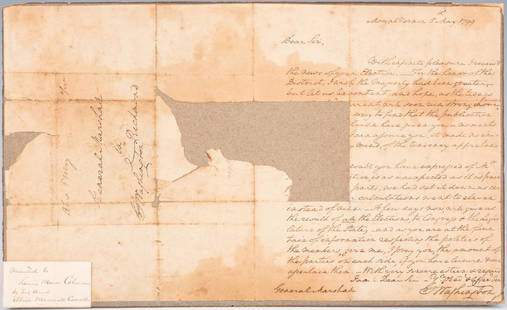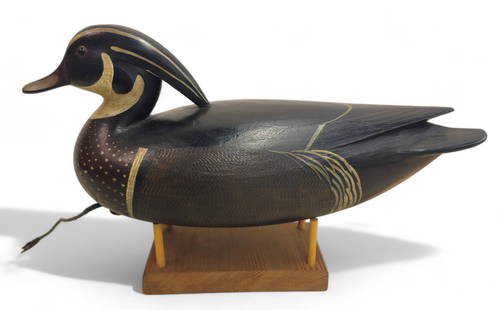
[Cardinal Richelieu] Intriguing Letter from the Brother of Cardinal Richelieu, the "Red Eminence" of
Similar Sale History
View More Items in Historical MemorabiliaRelated Historical Memorabilia
More Items in Historical Memorabilia
View MoreRecommended Collectibles
View More



![[Cardinal Richelieu] Intriguing Letter from the Brother of Cardinal Richelieu, the "Red Eminence" of](https://p1.liveauctioneers.com/6306/264859/138108637_1_x.jpg?quality=1&version=1665605145&width=486)
![[Cardinal Richelieu] Intriguing Letter from the Brother of Cardinal Richelieu, the "Red Eminence" of](https://p1.liveauctioneers.com/6306/264859/138108637_1_x.jpg?quality=80&version=1665605145)
Item Details
Description
In this letter, Alphonse-Louis du Plessis de Richelieu, the older brother of the French statesman and power broker Cardinal Armand-Jean du Plessis de Richelieu, discusses an accident that deprived him of the use of his arm for six or seven months. He also discusses an upcoming trip to Rome in the autumn of 1630. This Richelieu was also a cardinal and the archbishop of Lyon, from where he wrote this letter.
In this letter, Richelieu makes a brief reference to the advice he had given to Sir Lantelmi. There was a notary by that name in Aix-en-Provence in southeastern France, where Richelieu had been an archbishop from 1626 to 1628. Richelieu continues with reflections on how the people of Provence generally did not follow his advice.
ALPHONSE-LOUIS DU PLESSIS DE RICHELIEU, CARDINAL RICHELIEU, Autograph Letter Signed, to Unknown, April 24, 1630, Lyon, France. 2 pp., 8.5ʺ x 12ʺ. Some edge toning; very good.
Complete Transcript
"Monsieur Vous pourres recognoistre a mon escripture que j'ai en quelque facon recouvert l'usage du bras duquel j'ai este prive durant six ou sept mois et couru fortune de l'estre pour tout jamais Ce fascheux accident [je] m'est parle en ce qu'il me sert d'excuse legitime d'avoir demeure si long temps sans vous demander la continuation de votre (souvenir?) Je crois que mes lettres vous auroient este importunes. Vien[t] l'agreable recuperation que vous aves eue dont elles vous eussent (occasion?) de retourne[r] J'espere de faire ce voyage de Romme au commencement de l'authomne prochain et d'avoir en passant les fruicts de vos travails puis que loger de vostre courtoisie vous faict estre l'hoste de tous les cardinals Ce n'est pas comme tel que je pretends que vous me (recevrez?) mais comme estant de vos anciens amis qui est une qualite que j'estime bien fort veu que je scai que vous en scaves faire le choix Je m'efforcerai en une consideration de faire quelque chose en faveur du sr Lantelmi quoi que je n'ose asseurer du succes S'il eust cru le conseil que je lui donnai lors qu'il passa ycy il ne seroit pas en la peine ou il se trouve maintenant J'esprouve tous les jours qu'il est aise d'en donner aux provençaux mais impossible de les porter a les suivre la chaleur du Climat ou ils sont nes donnant a leurs langues des mouvements si prompts et leur faisant prendre des resolutions si dangereuses qu'il est impossible que leurs discours et leurs actions ne soient suivis d'un soudain repentir A la premiere veue nous en dirons davantage pour c'est [l']heure Il me suffist de vous asseurer que je suis
Mr Vostre tres affe[ctionne] a vous rendre service
le Cardinal Arch[evesque] de lion
A Lyon ce 24 Avril 1630."
Complete Translation
"Sir, You will be able to recognize from my writing that I have in some fashion recovered the use of my arm, of which I have been deprived for six or seven months and ran the risk of it being so forever. This annoying accident, I told myself, serves as a legitimate excuse for my having gone so long without asking for the continuation of your (souvenir?). I think that my letters have been a nuisance to you. Now comes the pleasant recovery that you had, in that they have had (the opportunity?) to return to you. I hope to make this voyage to Rome at the start of next autumn and to have in passing the fruits of your labors, since providing courtesy accommodations renders you the host for all the cardinals. It is not as such that I presume that you (will receive?) me, but as being one of your friends of old, which is a quality that I esteem very strongly, given that I know you know enough about this to make the choice. I will endeavor to consider something to do in support of Sir Lantelmi, although I dare not assume his success. If he had believed the advice that I gave him when he passed by here, he would not be in the difficulty he finds himself in now. I find every day that it is easy to give it [advice] to the people of Provence, but impossible to bring them to follow it, the warmth of the climate where they were born giving such quick movements to their tongues and making them take such dangerous resolutions that it is impossible that their speech and their actions be not followed by sudden regret. At first sight we will discuss this further, for it is late. It suffices to assure you that I am,
Sir, Your very affectionate servant,
the Cardinal Archbishop of Lyon
From Lyon, 24th April 1630."
Historical Background
During the War of the Mantuan Succession in 1628, Charles Emanuel I, duke of Savoy, allied with Spain. When Cardinal Armand-Jean du Plessis de Richelieu conquered Susa the following year, the duke of Savoy changed sides and allied with France. However, when King Philip IV of Spain sent invasion forces from Genoa and Como, the duke declared himself neutral. The French armies under Richelieu captured Pinerolo, south of Rivoli, Italy, in March 1630, in an effort to convince the duke to comply with their treaty. Cardinal Richelieu passed through Lyon at this time, and King Louis XIII followed soon after him. In September 1630, the king became very ill while in Lyon. When the king asked for the last sacraments, Cardinal Alphonse-Louis de Richelieu administered Holy Communion to the king.
Two months later, after the king had recovered, his mother Marie de' Médicis met with him in the Luxembourg Palace and demanded that he dismiss his advisor Cardinal Richelieu, who was also present. When the king retired to his hunting lodge in Versailles, the cardinal's enemies were exultant, and even Richelieu was convinced his career was over. However, the following day Louis summoned Richelieu to Versailles to assure him of his continued support. The "Day of the Dupes," as this event came to be called, ended with the Queen Mother exiled from France and Cardinal Richelieu restored to royal favor.
In 1634, four years after he wrote this letter, Cardinal Alphonse-Louis du Plessis de Richelieu was sent by his brother to obtain the annulment of the marriage of Gaston, duke of Orléans (1608-1660, younger brother of King Louis XIII) to Marguerite of Lorraine. Although Cardinal Alphonse-Louis and Pope Urban VIII established an amicable relationship, the cardinal made little progress in securing an annulment. Because Gaston did not have his permission to marry and Lorraine was an enemy, the king refused to recognize the marriage and had the Parlement of Paris declare it null and void in September 1634. Ultimately, Louis XIII on his deathbed in 1643 accepted his brother's plea for forgiveness and authorized the marriage.
Alphonse-Louis du Plessis de Richelieu (1582-1653) was born in Paris, the elder brother of Armand Jean du Plessis, who became the famed minister of King Louis XIII. The elder Richelieu was educated at the College of Navarre. He refused the position of bishop of Luçon in favor of his brother and entered the Carthusian Order, a particularly austere order in the Roman Catholic Church in 1602. He became prior of Bonpas, Caumont-sur-Durance, in southeastern France. There, his harsh censorship drove the philosopher and mathematician René Descartes (1596-1650) from France in 1628. Richelieu became archbishop of Aix in 1626 and archbishop of Lyon in 1628. He was created a cardinal in 1629 by Pope Urban VIII. He became grand almoner of France and dean of St. Martin's of Tours in 1632, abbot of St. Victor's in Marseille and of St. Stephen's at Caen in 1640, and as abbot of Chaise-Dieu in 1642. When his brother died, Richelieu succeed him as master of the Sorbonne University. After the death of Louis XIII, Richelieu rarely left Lyon.
Armand-Jean du Plessis de Richelieu (1585-1642) was born into a family of lesser nobility in Paris and suffered from ill health throughout his life. At age nine, he was sent to the College of Navarre in Paris to study philosophy and began to train for a military career. With a special dispensation from Pope Paul V because of his young age, Richelieu became bishop of Luçon. In 1614, he began to represent the clergy in the Estates-General, and he soon served King Louis XIII's wife, Anne of Austria. In 1616, the king made Richelieu the secretary of state with responsibility for foreign affairs. In 1622, at the king's nomination, Pope Gregory XV made Richelieu a cardinal. Appointed to the royal council of ministers in 1624, Richelieu quickly consolidated power by eliminating his chief rival with charges of corruption. As chief minister, Richelieu centralized power in France and opposed the Habsburg dynasty that ruled both Austria and Spain. He suppressed the influence of the nobility by destroying their fortified castles and defeated the political power of rebellious Protestant forces by 1629, though he retained religious toleration for Protestants granted by the Edict of Nantes in 1598. When Marie de Médicis, the king's mother and Richelieu's former patron, demanded his dismissal, Richelieu convinced the king to support him against his own mother and his brother, the duke of Orléans. Richelieu ruthlessly suppressed his political opponents, ordering the execution of some to intimidate his enemies and spying on others. In his exercise of authority, the Red Eminence, as he was known, consolidated royal power in France and ensured French dominance in the Thirty Years' War (1618-1648). Although a Catholic cardinal, he made alliances with Protestant states like the Kingdom of England and the Dutch Republic to achieve his goals. Centuries later, he was most well known as the villain in Alexandre Dumas's novel The Three Musketeers (1844).
This item comes with a Certificate from John Reznikoff, a premier authenticator for both major 3rd party authentication services, PSA and JSA (James Spence Authentications), as well as numerous auction houses.
WE PROVIDE IN-HOUSE SHIPPING WORLDWIDE!
Buyer's Premium
- 25%
[Cardinal Richelieu] Intriguing Letter from the Brother of Cardinal Richelieu, the "Red Eminence" of
Shipping & Pickup Options
Item located in Wilton, CT, usPayment

Auction Curated By



































































![Document Signed by Two Judges Later Connected to Salem Witch Trials: [SALEM WITCH TRIALS]. HATHORNE, JOHN. (1641-1717). Massachusetts Bay Colony magistrate remembered for his role in the Salem Witch Trials and great-great-grandfather of Nathaniel Hawthorne. ADS. (̶](https://p1.liveauctioneers.com/9124/328425/177345351_1_x.jpg?height=310&quality=70&version=1715202740)
















